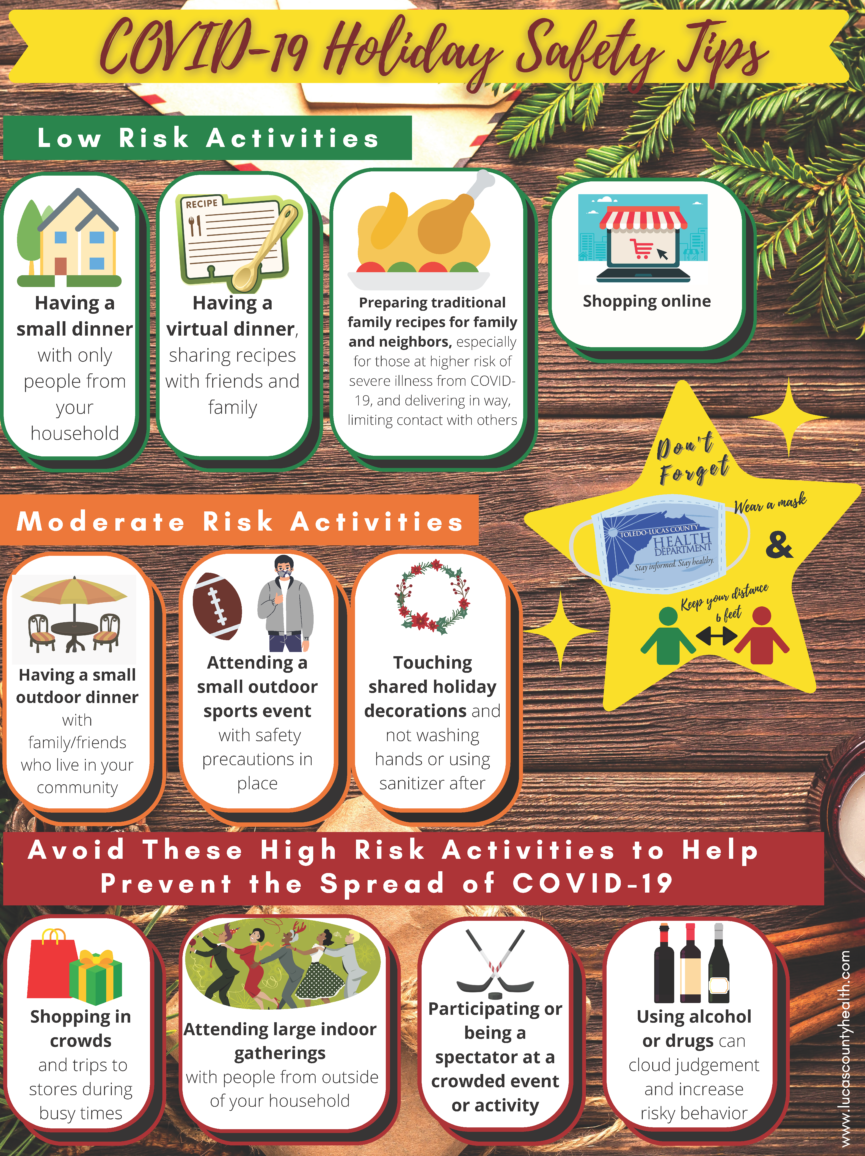
Safer Ways to Celebrate Holidays
Holiday traditions are important for families and children. There are several ways to enjoy holiday traditions and protect your health. Because many generations tend to gather to celebrate holidays, the best way to minimize COVID-19 risk and keep your family and friends safer is to get vaccinated if you’re eligible.
Important Ways to Slow the Spread of COVID-19
- Get a COVID-19 vaccine as soon as you can. Find a vaccine.
- Wear a mask that covers your nose and mouth to help protect yourself and others.
- Stay 6 feet apart from others who don’t live with you.
- Avoid crowds and poorly ventilated indoor spaces.
- Test to prevent spread to others.
- Wash your hands often with soap and water. Use hand sanitizer if soap and water aren’t available.
Here are safer ways to celebrate the holidays:
Generally:
- Protect those not yet eligible for vaccination such as young children by getting yourself and other eligible people around them vaccinated.
- Wear well-fitting masks over your nose and mouth if you are in public indoor settings and you are not fully vaccinated.
- Even those who are fully vaccinated should wear a mask in public indoor settings in communities with substantial to high transmission.
- Outdoors is safer than indoors.
- Avoid crowded, poorly ventilated spaces.
- If you are sick or have symptoms, don’t host or attend a gathering.
- Testing can give you information about your risk of spreading COVID-19.
- Consider using a self-test before joining indoor gatherings with others who are not in your household.
- A positive self-test result means that you have an infection and should avoid indoor gatherings to reduce the risk of spreading disease to someone else.
- A negative self-test result means that you may not have an infection. Repeating the test with at least 24 hours between tests will increase the confidence that you are not infected.
- Ask your healthcare provider if you need help interpreting your test results.
If you are considering traveling for a holiday or event, visit CDC’s Travel page to help you decide what is best for you and your family. CDC still recommends delaying travel until you are fully vaccinated.
- If you are not fully vaccinated and must travel, follow CDC’s domestic travel or international travel recommendations for unvaccinated people.
- If you will be traveling in a group or family with unvaccinated people, choose safer travel options.
- Everyone, even people who are fully vaccinated, is required to wear a mask on public transportation and follow international travel recommendations.
Special considerations:
- People who have a condition or are taking medications that weaken their immune system may not be fully protected even if they are fully vaccinated and have received an additional dose. They should continue to take all precautions recommended for unvaccinated people, including wearing a well-fitted mask, until advised otherwise by their healthcare provider.
- You might choose to wear a mask regardless of the level of transmission if a member of your household has a weakened immune system, is at increased risk for severe disease, or is unvaccinated.
- If you are gathering with a group of people from multiple households and potentially from different parts of the country, you could consider additional precautions (e.g., avoiding crowded indoor spaces before travel, taking a test) in advance of gathering to further reduce risk.
- Do NOT put a mask on children younger than 2 years old.
By working together, we can enjoy safer holidays, travel, and protect our own health as well as the health of our family and friends.

